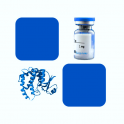
- Remove this product from my favorite's list.
- Add this product to my list of favorites.
Products
Newsletter
 |  |  |  |  |  |

Background
Proprotein convertase subtilisin/kexin type 9 (PCSK9), is an enzyme which in humans is encoded by the PCSK9 gene. This gene encodes a proprotein convertase belonging to the proteinase K subfamily of the secretory subtilase family. This protein plays a major regulatory role in cholesterol homeostasis. PCSK9 binds to the epidermal growth factor-like repeat A (EGF-A) domain of the low-density lipoprotein receptor (LDLR), inducing LDLR degradation. PCSK9 may also have a role in the differentiation of cortical neurons. Mutations in this gene have been associated with a rare form of autosomal dominant familial hypercholesterolemia (HCHOLA3).
Source
Recombinant Biotinylated Human PCSK9, Avitag,His Tag (PC9-H82E7) is expressed from human HEK293 cells. It contains AA Gln 31 - Gln 692 (Accession # Q8NBP7-1).
Predicted N-terminus: Gln 31
Molecular Characterization
This protein carries an Avi tag (Avitag™) at the C-terminus, followed by a polyhistidine tag. This protein undergoes autocatalytic cleavage to release the pro-peptide and mature chain. The pro-peptide and mature chain are associated through non‑covalent interactions and with a calculated MW of 13.8 kDa and 59.9 kDa respectively. The protein migrates as 17 kDa and 63-66 kDa under reducing (R) condition (SDS-PAGE) due to glycosylation.
Biotinylation
Biotinylation of this product is performed using Avitag™ technology. Briefly, the single lysine residue in the Avitag is enzymatically labeled with biotin.
Biotin:Protein Ratio
Passed as determined by the HABA assay / binding ELISA.
Endotoxin
Less than 1.0 EU per μg by the LAL method.
Purity
>90% as determined by SDS-PAGE.
Formulation
Lyophilized from 0.22 μm filtered solution in PBS, pH7.4 with trehalose as protectant.
Reconstitution
Please see Certificate of Analysis for specific instructions. For best performance, we strongly recommend you to follow the reconstitution protocol provided in the COA.
Storage
For long term storage, the product should be stored at lyophilized state at -20°C or lower.
Please avoid repeated freeze-thaw cycles.
This product is stable after storage at:
-20°C to -70°C for 12 months in lyophilized state;
-70°C for 3 months under sterile conditions after reconstitution.
Bioactivity
Please refer to product data sheet.
(1) "APOE and familial hypercholesterolemia"
Civeira, Martín, Cenarro
Curr Opin Lipidol (2024)
(2) "Safety of Monoclonal Antibodies Inhibiting PCSK9 in Pregnancy: Disproportionality Analysis in VigiBase®"
Noseda, Bedussi, Panchaud et al
Clin Pharmacol Ther (2024)
(3) "Comparing PCSK9 Monoclonal Antibody Treatment Strategies Following Myocardial Infarction Using Negative Control Outcomes: A Target Trial Emulation Study"
Sloot, Breskin, Colantonio et al
Epidemiology (2024)
Showing 1-3 of 6006 papers.
(1) "Structure-activity analysis of truncated albumin-binding domains suggests new lead constructs for potential therapeutic delivery"
Authors: Wang CK, Amiss AS, Weidmann J
Journal: J Biol Chem 2020
Application: SPR
(2) "Oligonucleotides Comprising Modified Nucleosides"
Authors: J Carter, et al
Journal: US20190177730A1 2019
Application: ELISA
(3) "Calcium-mediated allostery of the EGF fold"
Authors: Wang CK, et al.
Journal: ACS Chem Biol 2018
Application: SPR
(4) "Evolution of sequence-defined highly functionalized nucleic acid polymers"
Authors: Chen Z, et al.
Journal: Nat Chem 2018
Application: SPR
Follow us